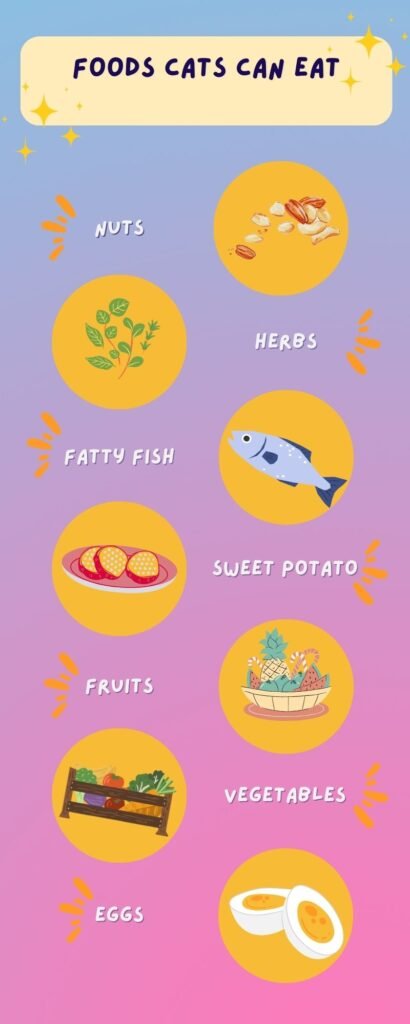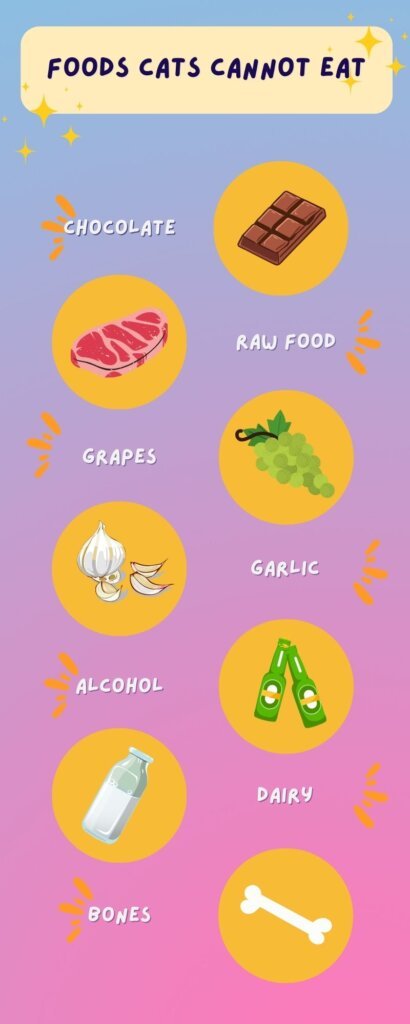As a cat owner, you likely wonder what foods are okay to feed your feline friend. Can cats eat certain table scraps or will these upset their stomachs? Understanding what foods cats can and cannot eat helps keep your pet stay happy and healthy.
In this article, we’ll explore some human edibles that are fine for cats and some unsafe items to avoid.
Foods Cats Can and Cannot Eat: Understanding the Basics
Cats require a precise balance of nutrients to thrive. Unlike dogs, cats are obligate carnivores meaning they depend almost entirely on animal-based proteins. Their bodies are designed for deriving energy and minerals from meat. However, they also need moderate amounts of vitamins, carbohydrates and fats found in plant-based foods.
When creating meal plans, it’s essential to include both meat and vegetable elements. An improper diet can lead to obesity, malnutrition, or even serious illnesses in cats. Consulting with your veterinarian is key to developing the ideal nutritional regimen tailored to your cat’s needs.
Approved Foods for Cats: Nutritional Necessities

While commercial cat foods formulated for feline health should be your pet’s dietary foundation, occasional treats of certain human edibles can provide nutrition. Here are some cat-safe options:
Meat
Cats are obligate carnivores, so they thrive on meat-based diets. Cooked chicken, turkey, beef, and lean deli meats (in moderation) are generally safe. However, avoid feeding them seasoned or raw meats as they can contain harmful bacteria.
Fish
Fish can be fed to cats occasionally, but not as a primary diet. Too much fish can lead to nutrient deficiencies due to its low content of certain essential nutrients, and some fish, like tuna, can contain high levels of mercury.
Herbs
Cat-friendly herbs like parsley, rosemary, thyme and catnip introduce new flavors and antioxidants. Use pinches of these fresh or dried herbs to add interest to your cat’s meals. Introduce new herbs gradually to confirm they don’t cause stomach upset.
Broths
Unseasoned broths make healthy hydrating treats for cats. Opt for low-sodium chicken, turkey or meat broths with no onions or garlic. Limit to a tablespoon or two at a time to supplement your cat’s diet with savory broth.
Honey
100% raw honey offers probiotics, vitamins and antioxidants. A quarter teaspoon provides natural sweetness your cat may enjoy. Be sure honey is specifically produced for humans and limit portions to prevent excess sugar.
Jaggery
This unrefined sugar offers antioxidants and minerals like iron, magnesium, and potassium. Use only 100% pure, uncontaminated jaggery and limit to a pinch. Introduce slowly mixed into food as the sweetness may cause stomach upset if overfed.
Eggs
Eggs are an appealing way to satisfy a cat’s natural craving for bird prey. Scrambled eggs make a protein-packed occasional snack. Prepare plain scrambled eggs with no salt, dairy, or oil added. Feed just a tablespoon or two once a week at most. Excess egg intake can lead to biotin deficiency in cats impacting skin and coat health.
Avoid raw meats which may contain harmful bacteria. For picky cats, complement meals with tasty meat-based cat food or broths.
Healthy Grains
In addition to proteins and vegetables, most cats can enjoy the occasional carbohydrate-based treats such as cooked grains. Whole grain options like rice, pasta, or oatmeal provide beneficial fiber, nutrients, and energy. Grains add diversity to feline diets in moderation.
When introducing grains, cook them thoroughly and limit portions to a few tablespoons per meal at most. Monitor your cat’s digestion carefully, as excessive grains may cause gastrointestinal upset. Starting with small portions allows your cat’s system to adjust.
Fruits
Cats also appreciate fruit snacks for supplemental vitamins and minerals. Focus on providing cat-safe fruits in small amounts such as blueberries, cantaloupe, and watermelon. Blueberries provide antioxidant benefits from compounds like anthocyanins.
Their small size makes them easy to incorporate. Cantaloupe is rich in beta-carotene, vitamin C, and potassium while providing hydration. Watermelon makes a refreshing treat with its high water content. Limit overall fruit to just a teaspoon or two per day.
Avoid sugar, syrups, or citrus fruits which may upset a cat’s sensitive digestion. With an incremental introduction, fruits can be a healthy complement to your cat’s regular diet.
Vegetables
While vegetables play a smaller role in feline diets, cats can enjoy limited portions of certain cat-friendly veggies. Adding small amounts of cooked vegetables supplements their nutrition with valuable antioxidants, vitamins, and minerals.
Cooked, mashed carrots provide beta-carotene, vitamin A, and fiber. Carrots should be well-cooked and mashed or pureed thoroughly. Cooked spinach is an excellent occasional source of iron, folate, fiber, and phytonutrients. Lightly steam or blanch spinach to retain nutrients yet soften it.
Steamed broccoli and cabbage florets make an excellent limited veggie source thanks to their vitamin C, K, and folate content. Peas are another antioxidant-rich choice that provide vitamin K, beta-carotene, and lutein.
Unsafe Foods for Cats: Potential Health Hazards

While our curious kitties will try to snack on anything within paw’s reach, there are definitely some foods that are no-no’s for cats. Cats have different nutritional needs than people, and their bodies don’t process certain foods very well. In the following sections, we’ll talk about which foods and ingredients are unhealthy or even dangerous for cats, so you can keep your furry friend safe and healthy.
Raw Foods
Raw meat, eggs, and fish pose a huge risk and should never be fed to cats. Consuming these uncooked animal proteins can expose cats to harmful bacteria like salmonella. This can lead to food poisoning and severe gastrointestinal illness in cats. Always be sure to cook meat fully and do not offer any raw egg or fish.
Onions, Garlic, and Chives
Onions, garlic, and chives contain toxic compounds that are very dangerous to cats. These substances can cause the oxidative damage of red blood cells known as hemolytic anemia. Left untreated, this condition can be fatal. Never add any foods containing onions or garlic to your cat’s meals or leave uneaten portions within their reach.
Chocolate
Chocolate contains theobromine, a stimulant toxic to cats in even small amounts. Ingestion can induce life-threatening seizures, tremors, and heart arrhythmias. Make sure to keep all chocolate and cocoa products well out of reach of your curious cat. Promptly call your vet if you suspect chocolate was ingested.
Fruits to Avoid for Cats
While fruits can be healthy for cats in moderation, there are certain fruits that should be completely avoided. Grapes, raisins, currants, and citrus fruits like oranges, lemons, limes and grapefruit are unsafe for cats. Grapes and raisins, even in tiny amounts, can cause sudden kidney failure in cats through unknown toxins. If ingestion is suspected, promptly contact your veterinarian. The acids in citrus fruits can cause gastrointestinal upset in cats including vomiting, diarrhea and even central nervous system depression at high doses.
Never share grapefruit, oranges, lemons or lime with your cat. Also avoid sugary, syrupy fruits like canned peaches as excessive sugar is unhealthy for cats. Focus only on soft, feline-safe fruits in tiny portions like berries, melons and bananas.
Xylitol
Xylitol is an artificial sweetener found in many gum and diet food products. While fine for humans, it can induce liver failure in cats who ingest it. Make sure foods containing xylitol are not left anywhere your cat could access them. Seek immediate veterinary treatment if xylitol exposure is suspected.
Alcohol
Alcohol contains ethanol that is toxic to cats when ingested. Intoxication occurs rapidly and can quickly lead to dangerous degrees of poisoning. All alcoholic drinks should be kept securely away from pets at all times. Immediately call your vet if you believe your cat consumed alcohol.
Dairy Products
Most cats are lactose intolerant, meaning they lack the enzymes needed to properly digest lactose in cow’s milk. Milk and dairy products will likely cause diarrhea or other intestinal upset. However, some cats can tolerate small portions of lactose-free milk or other vet-approved cat milk products.
Avoid Nuts for Cats
Nuts are not an appropriate or safe food for feline diets. While humans enjoy nuts for their flavor, protein, and nutrients, their high fat content makes them unsuitable as substantial treats for cats. Additionally, some specific nuts like macadamia nuts contain unknown toxins that can cause severe reactions in cats if ingested.
Other nuts like almonds are high in fat and calories leading to rapid weight gain or pancreatitis risks. For optimal health, it is best to avoid sharing any nuts with your cat when snacking.
Bones
Any bones, whether cooked or raw, risk splintering once chewed and pose a grave threat of obstructing or even puncturing your cat’s fragile digestive tract. Do not feed or allow access to bones of any kind.
Dog Foods
Dog food is formulated to meet canine nutritional requirements. It lacks key nutrients cats need and risks causing deficiencies leading to conditions like anemia, weight loss, and maldigestion issues. Only provide vet-recommended, cat-formulated food designed to meet your feline’s needs.
When uncertain about the safety of a specific food, it is best to avoid offering it to your cat. Only provide foods definitively established as cat-safe through careful research and your veterinarian’s guidance.
Moldy Food
Moldy leftovers contain mycotoxins extremely toxic to cats’ liver, kidneys, and brain. Promptly discard any moldy human food remains.
Tips for Safely Introducing Foods to Your Cat
When bringing new human foods into your cat’s diet:
- Start by offering a tiny portion like a pinch or teaspoonful. Observe your cat closely for reactions. If they readily accept the food, watch for stomach upset signals like vomiting or diarrhea afterward.
- Gradually increase the amount over a week or more if the food is well-tolerated. This allows your cat’s digestive system time to adjust. Discontinue foods causing adverse reactions.
- Always check with your veterinarian before introducing new foods, especially if your cat has any underlying health conditions. Get tailored advice catered to your individual pet’s needs.
Considering the Feline Diet: Implications of Dietary Choices
While the occasional human food treat can be safe, your cat’s primary diet should be quality cat food providing complete and balanced nutrition. Human foods lack key feline nutrients when fed exclusively. Lean meats, fatty acids, vitamins, and minerals specific to cats’ biological needs are critical.
Consult your vet to find an optimal commercial diet for your pet’s age and activity level. With informed supervision, sharing human foods can provide cats enrichment, but should not replace balanced cat-formulated meals.
Professional Guidance for Cat Diet: Veterinarian Recommendations
With their unique biology and needs, developing an optimal nutritional plan for your cat requires professional guidance. Establishing a relationship with a trusted veterinarian provides invaluable support for all aspects of your cat’s health.
Schedule wellness check-ins at least annually so your vet can evaluate your cat’s weight, body condition, and energy levels. They can then tailor diet recommendations to your cat’s age, activity level, and medical status. For example, senior cats may need more easily digestible foods, while growing kittens require diets supporting development. Discuss proper portion sizes as overfeeding can quickly lead to obesity.
Conclusion
Understanding what foods cats can and can’t eat safely helps pet owners integrate appropriate treats. Some herbs, broths, and honey can supplement feline diets in moderation. But foods like onions, alcohol, and xylitol should be avoided entirely.
Introducing new foods gradually and consulting your vet allows cats to benefit from human edibles while avoiding risks.
